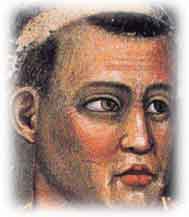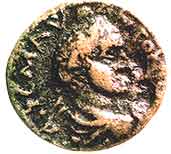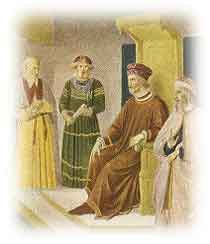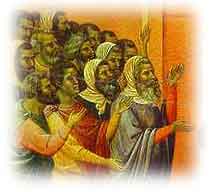Politics & Religion in Jesus' Time
The political and religious background that surrounds the ministry of both John the Baptist and Jesus is as follows:

It was the fifteenth year of the reign of Tiberius Caesar, the emperor of Rome. Tiberius had distinguished himself as a citizen for his oratory skills, as a soldier and a public official. As emperor of Rome he was slothful, self indulgent, licentious, vindictive and cruel. He was a master at lying and he was very cunning.

Pontius Pilate was the governor of Judea for 10 years. He had entered public life not for pure of lofty reasons but to advance his own career and serve his own selfish purposes. He was ruthless and murderous, with a reputation among the Jews he ruled as being tyrannical and tempestuous. He had a very low and corrupt character.
Herod (also called Antipas) was ruler of Galilee. Herod was first married to a daughter of King Aretas of Arabia; then he took Heroidas, his brothers’ wife, as his own wife. This sinful act resulted in the death of John the Baptist and the overthrow and banishment of Herod and his unlawful wife.

Philip, the half brother of Herod (Antipas), was ruler of the region of Ituraea. He was the only decent ruler from the line of Herod. He was known for his moderation and his justice.
Trachonitis and Lysanias were the rulers of Abilene, a region 18 miles from Damascus. History gives us no account of these men.

The High Priesthood of Annas and Caiaphas. Annas was the father in law of Caiaphas, and although Caiaphas was the official high priest of Israel, Annas who had been the former high priest still held power and authority. Caiaphas is the high priest that tore his clothes and declared Jesus worthy of death.
These are the prominent political and religious figures that were on the historical landscape at the time that John the Baptist and then Jesus began their public ministries.
Scribes
The word “scribe” is the English translation of the Greek word “Grammateis”, which means “student of the scriptures.” Scribes were men whose primary occupation was writing out copies of the Jewish Scriptures and teaching the people what the law said.
Because they copied the Old Testament books, they were familiar with the Hebrew Scriptures and were respected in society for their literacy and knowledge. The scribes provided teaching that was the religious and moral backbone for the Jewish people during the time of Jesus. Because of their role, there were often addressed as, “Teacher.”
They were trusted as professional interpreters and as ones who could judge individual cases as they related to Jewish law. Scribes were, therefore, also trusted as lawyers within Jewish society. As the scribes were the most learned individuals on the fine details of following Jewish law, their duties also consisted of deciding on specific questions of the law in individual cases.
Scribes had no authority in themselves, but rather they continually deferred to the authority of other scribes and traditions to support their positions. The scribes were some of Jesus’ most adamant opponents. In their minds, the Messiah who the Old Testament Scriptures spoke about did not seem to match up with who Jesus was.
Pharisees
The Pharisees were religious leaders in the Jewish society at the time of Jesus. They were religious fundamentalists who focused on strict observance of the Jewish laws, ceremonies and traditions. There were around 6,000 Pharisees during Jesus’ time on earth. Pharisees were leaders in the local synagogue. Most every Jewish community had their own synagogue, while there was only one temple and it was in Jerusalem.

Pharisees strongly encouraged the Jewish people to pursue righteousness by closely following the Jewish laws and not compromising with the beliefs and ways of the Romans. The Pharisees openly opposed Jesus for many reasons. They were particularly appalled at his acts of healing people on the Sabbath and his blatant claims to divinity.
Jesus denounced them as being hypocrites. They often lived moral lives, full of good deeds, but it was all outward actions with no thought given to the heart or motives of the actions.
Sadducees
The Sadducees were Jewish religious leaders who were primarily from the upper-class, were much more sympathetic to the Romans and sought to maintain their aristocratic positions in society. They often disagreed with the Pharisees because the Sadducees rejected the oral traditions and much of the doctrine of the Pharisees.

The Sadducees were opposed to Jesus because there was the supposed threat that Jesus could potentially overthrow the Roman government, thus jeopardizing their positions of prestige. Sadducees lived primarily in Jerusalem and their lives were often focused around the happenings of the Jewish temple in Jerusalem.
The Sanhedrin (the judicial council of the Jewish people) was comprised primarily of Sadducees.
Lawyers
The lawyers in Jesus time were the scribes. Jewish scribes functioned not only to preserve the Scriptures by copying them and teaching them, but also by settling disputes and questions regarding the laws of Moses. See the definition of “scribe” for more information.
Teachers
The word “teacher” usually comes from the Hebrew word, “Rabbi”. Teacher is the term that Jews used to address their religious leaders. Because scribes were the most educated in the scriptures and fulfilled the role of instructing others, they were often addressed as “teacher.”
Jesus was recognized as a Teacher who stood apart from other teachers. Most teachers would appeal to other teachers or famous scribes to support their statements, while Jesus spoke as one who had authority in himself.
